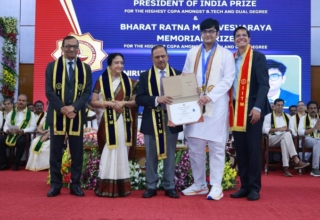
Around 5 million students go abroad every year in the world. Out of these, about one million are Indian students and around fifty thousand students come to India. As the demand for higher education rises, Government of India is looking at ways to make Indian Higher Education attractive and relevant. The Ministry of Commerce is trying to help domestic education service providers, by trying to get them market access. The second step is “mutual recognition of qualifications,” as was done with the UK recently and is under negotiation with Australia. Third, “is a post-study work visa requirement” for Indian students abroad as per an official of the ministry.
According to Minister of State for Education, Dr Subhas Sarkar, the government is committed to transforming India into a global education hub and attracting international students. Under the ‘Study in India’ program, the government proposes to attract international students from 35 focus countries,” he added while inaugurating 17th FICCI Higher Education Summit 2022 in New Delhi on Nov 16.
Cutting the clutter and moving from the plethora of MoUs between academic institutions and foreign universities to meaningful and functional agreements is one of the prescriptions necessary for developing India as the global higher education hub according to Ministry of External Affairs (MEA) establishment.
Speaking the conference, Sanjay Verma, and Secretary (West), MEA, said that a way of making country’s higher education system attractive to foreigners, the easiest route is to make it relevant to the times. “Like our think tanks that are capturing global attention through their academic output and adoption of newer mediums like television and podcasts, HEIs can also create a reputation not only for foreign students but all students in the country. Innovation, incubation, R&D, and entrepreneurship need to be seen as establishing a synergy with institutions of higher learning,” he added.
Pawan Agarwal, Former Secretary, Government of India, a known researcher of higher education in India says as many as 180 universities now have an office for international affairs. “A decade or more ago, we did not have more than 15 universities having international offices.”
MoS Education, Dr Sarkar stated that research and teaching collaborations and faculty & student exchanges with high-quality foreign institutions will be facilitated, and relevant mutually beneficial MoUs with foreign countries will be facilitated more and more. “India is among the highest contributors to students wanting to study in other countries and is a famous destination for students from SAARC, Central Asian countries & Africa. As satellite campuses are growing and with the NEP, international institutions will make India their home while prestigious Indian institutions are looking to set up off-shore campuses. All of this shows that education has become more internationalized and the demand for quality education goes beyond geography,” stated Dr Sarkar.
Dr Prem Singh, Advisor- Education, NITI Aayog, averred that “we need to understand our comparative advantage” and “build a vibrant research and innovation ecosystem in higher education”. He advocated building a narrative on the strengths of the Indian higher education system. Dr Abhay Sinha, Director General, SEPC, said, “Market access, information on global markets, FTA, will provide many ideas on promoting higher education”.








